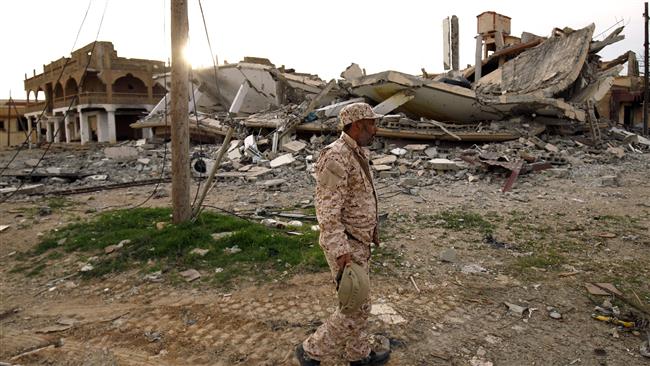Over 140 people, mostly troopers, killed in southern Libya airbase attack


More than 140 people, mostly soldiers, have been killed at an airbase in southern Libya after militiamen, loyal to the UN-backed Government of National Accord (GNA), allegedly launched an attack against the base.
The deadly incident occurred on Thursday, when members of the Third Force militia attacked the Brak al-Shati airbase, some 650 kilometers south of the capital Tripoli, killing 141 people.
The airbase has been used by Field Marshal Khalifa Haftar’s self-proclaimed Libyan National Army (LNA), and according to a late Friday statement by LNA spokesman Ahmad al-Mesmari, 103 of those killed in the assault were LNA troops and the rest were civilians working at the base or living in its vicinity.
“The soldiers were returning from a military parade. They weren’t armed. Most of them were executed,” he further said, adding that summary executions had reportedly taken place.
Libya has faced a power vacuum since a US-led military intervention resulted in the downfall of its longtime dictator Muammar Gaddafi in 2011. The country has been grappling with chaos and the emergence of numerous militant groups, including Daesh Takfiri terrorists who are concentrated in Iraq and Syria.
The country has now two governments, with one based in Tripoli, where the GNA, led by Fayez al-Sarraj, is ruling, and the other centered in the far east in the city of Tobruk, where the LNA runs its affairs. The UN supervised a series of negotiations in 2015 that led to the establishment of the GNA late that year. However, both Haftar and the allied eastern-based parliament have refused to recognize the UN-backed unity government.

The GNA, for its part, also issued a statement on Friday night, saying it had commissioned an investigation into the incident. It further said it had decided to suspend its Defense Minister al-Mahdi al-Barghati, and the head of the Third Force from their duties until those involved in the attack were identified.
UN ‘outraged’ at number of fatalities
Earlier on Friday, UN Envoy to Libya Martin Kobler sounded alarm at reports of the deadly attack.
“I am outraged by reports of significant numbers of fatalities, including civilians and by reports that summary executions may have taken place,” he added.
On May 2, Sarraj and Haftar held a rare meeting in Abu Dhabi, a major city in the United Arab Emirates, and reached an agreement to unify their efforts to curb terrorists, including those of the Daesh Takfiri group.
The Thursday incident, however, seems to endanger the agreement. Aguila Saleh, the speaker of the eastern-based parliament, accused the Misrata-based Third Force of a “serious breach of the truce agreement reached in Abu Dhabi.”







